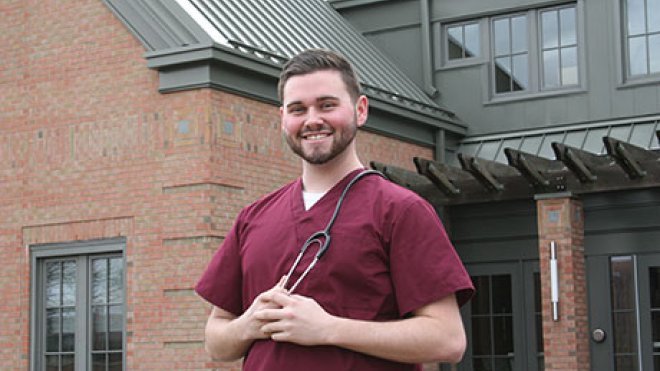From Volunteer to Hassenfeld Fellow: Turning a Passion for Public Health Service into a Deeper Commitment
Cory Letendre ’18 doubled down on his commitment as a medical assistant at the R.I. Free Clinic serving uninsured and underinsured adults

PROVIDENCE, R.I. – When a seemingly healthy-looking, 87-year-old woman walked into Providence’s Rhode Island Free Clinic, Cory Letendre made an educated observation that something was wrong when he measured a dangerously high blood pressure. With the knowledge and skills he had already gained from his courses guiding him, the senior biology and public health double major worked with the clinic’s physicians to identify the issue and provide the woman the treatment she needed.
Seeking a way to expand upon his work at the R.I. Free Clinic where he already had put in 200 hours as a medical assistant volunteer, Letendre became a Hassenfeld Student Leadership Fellow, a commitment that would deepen his involvement within the greater Providence community by investing even more hours working at the clinic during his senior year at RWU. The Hassenfeld Student Leadership Fellowship Program enables students to build real-world skills by working with community partners, while creating a meaningful impact on the communities within which they learn, work and live.
“I really wanted to do the Hassenfeld program as a motivation for me to get even more involved in the community and the R.I. Free Clinic,” said Letendre, who recently completed 400 hours serving needs at the clinic.
In Rhode Island, there are an estimated 50,000 adults who are uninsured and unable to afford necessary health care, according to Letendre. He said that it was hearing this staggering statistic that inspired him to give back as a medical assistant last year.
But Letendre emphasized that his work wasn’t just something that benefitted the community – it’s also a way for him to gain experience with direct patient care, which would be a huge leg up when applying for physician assistant graduate programs.
That concept of mutually-benefitting service work is built into RWU’s mission to strengthen society through engaged teaching and learning, says KC Ferrara, director of the Feinstein Center for Service Learning and Community Engagement which connects students to community-engaged service through the Hassenfeld Student Leadership Program and many other opportunities.
“Cory fills a true need at the clinic, which is precisely what service should do,” Ferrara says. “The organization should determine what’s needed versus our telling them what we think they need. It has to be a collaborative dance, and the community partner should come out on top.”
One major need Letendre has been able to fulfill is the development and implementation of an efficient mental health screening protocol for the clinic’s patients. In doing this work, Letendre strongly credits his public health courses in helping him develop the protocol.
“Taking the skills in my public health courses and applying them to what I’m doing in the field, is one of the many ways that my coursework here has helped in preparing me for the real world,” Letendre said. “And it has made me far more well-rounded than I could have ever imagined before coming into the clinic.”
Ferrara says kind of experiential learning opportunity allows students to put their skills and knowledge to work solving real needs with community partners.
“Cory is using this experience to build skills directly related to his major and his career goals” Ferrara said. “We offer so many of these tools at RWU, but not everyone takes the initiative or is so intentional about their experiences. Cory is so self-motivated and has such clear goals for his future – and this really shows. I believe he inspires others to reach the same level.”
By being able to commit 400 hours to working within a community of uninsured adult Rhode Islanders through the Hassenfeld Fellows program, Letendre has recognized that he wants his future career to be in a place similar to the clinic – one that is highly focused on the direct care and outcomes of their patients.
As graduation approaches in May, Letendre – a Pawtucket native – says he knows that his involvement in the community will not end here. He plans to continue volunteering at the clinic, and hopes that his work will inspire other Roger Williams students to get involved in the community and with organizations like the R.I. Free Clinic.
“I have learned more about Providence, and Rhode Island as a whole, through getting involved in this particular community, and understand more just how prominent healthcare loss in the state is,” he said. “I wouldn’t have learned this without working at the clinic and without coming to RWU.”
At RWU, we develop Civic Scholars who believe in community-engaged work. That’s why we commit to providing every student an opportunity that empowers them to put their knowledge and skills to the test solving real-world problems and creating meaningful change with community partners. Learn more about the Civic Scholars program and how to help us reach our goal of every student participating in civic scholarship.
